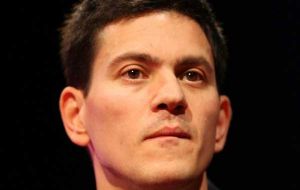MercoPress. South Atlantic News Agency
Inequality, greatest threat to global stability warns UK
 “Let's commit to living in a more equal world” said Miliband
“Let's commit to living in a more equal world” said Miliband Inequality is one of the greatest threats to global stability and prosperity, the United Kingdom's Foreign Minister told the General Assembly, issuing a call to industrialized nations to meet their commitments on aid, genuinely reform the international terms of trade and play their part in tackling climate change.
David Miliband said the world cannot stand united against shared threats and opportunities when there are so many economic and political disparities between States and peoples. "We live in a more prosperous world, a more peaceful world, a more democratic world than ever before," he said. "Let's commit to living in a more equal world." Mr. Miliband described inequalities as "not just morally offensive; they are also dangerous. Inequality fuels extremism. It undermines support for an open global economy. It corrodes trust and reciprocity between nations." Although many of the world's poorest nations were now posting the largest rates of economic growth, he said around a billion people in 58 countries have been "left out of the story of human progress," condemned to a low life expectancy because of illnesses and malnutrition. "Despite progress in some countries, the world is off track to meet its Millennium Development Goals (MDGs)," he said, referring to the set of eight anti-poverty and related targets that world leaders agreed at a UN summit in 2000 to strive to reach by 2015. The Foreign Minister said national action was not sufficient given that the causes of inequality transcended State boundaries. He called on the countries of the developed world to meet their previously announced commitment to spend 0.7% of their national income on development, adding that the UK will meet this target by 2013. New trade rules that are fairer to poorer economies need to be developed as well, Mr. Miliband said, arguing that a successful conclusion later this year to the current Doha round of talks is feasible. He said the current arrangements were unsustainable. "Western producers continue to benefit from subsidies and tariffs, particularly for agriculture. Higher tariffs for processed goods prevent poor countries diversifying their economies. This is a bad deal for Western consumers, and it squeezes out the livelihoods of producers in poorer countries. It is neither in rich countries' financial self-interest, nor is it fair." But the greatest long-term threat of all, Mr. Miliband stressed, was the impact of climate change, especially on the poorest countries. He said the UN Framework Convention on Climate Change (UNFCCC) was the only body that can conclude a meaningful agreement on global warming to succeed the first commitment period of the Kyoto Protocol on greenhouse gas emissions. "At the heart of an agreement must be the principle of common but differentiated responsibilities. All countries must take on responsibilities, but these must be equitable distributed, with the greatest action taken by the richest countries. The UK stands ready to play its part".




Top Comments
Disclaimer & comment rulesCommenting for this story is now closed.
If you have a Facebook account, become a fan and comment on our Facebook Page!